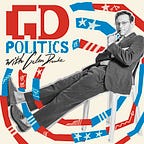When President Trump became the first Republican in 20 years to win the national popular vote in 2024, one Republican pollster was in a position to say: “I told you so.”
Patrick Ruffini, the co-founder of Echelon Insights, had written a book the year prior titled, “Party of the People: Inside the Multiracial Populist Coalition Remaking the GOP.”
He wrote, “The Republicans used to be seen as the party of wealthy elites and the Democrats the party of blue collar workers—and now that’s being turned upside down. Because of this, the ‘demography is destiny’ ideas of eternal Democratic majorities never materialized. And now it’s Republicans who are on offense with voting blocs who represent a decisive majority of the country.”
He went on to say, “Contrary to the media myths, the old divisions that separated Americans politically and in other ways by race and ethnicity are gradually fading. This is what’s making Republicans competitive in areas they never dreamed of winning before.”
This was hard to deny in 2024. Republicans made decisive gains with voters of color and young voters, with eye-popping rightward shifts in places like Florida, Texas and the urban Northeast.
But if Trump’s already souring polling this year hadn’t been reason for pause, this fall’s elections certainly were. As we discussed on last week’s podcast, in New Jersey, there appeared to be something of a snap back amongst Hispanic and young voters to coalitions resembling the 2020 election.
In light of that, I invited Patrick Ruffini on the podcast to talk about the ever-shifting American political coalitions. He joined me to discuss his book on the forbearer to this podcast, but this was his first time on GD POLITICS. We also discussed his work at Echelon Insights highlighting the diversity of opinion that sits below the polarized red/blue surface of American politics.












